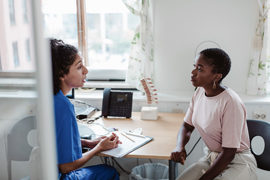Have You Received Important but Unexpected Genetic Test Results?


Genetic testing sometimes tells a person or family unexpected results. These genetic test results are unrelated to the initial reason why the testing was done. These kinds of results are called "secondary results" or "secondary findings."
Secondary results are important for a person's health – they are not related to ancestry or parentage. Most secondary results tell a person that they may be at a higher risk to develop a disease which can be treated or prevented with specific healthcare. Common examples of this are cancer and some kinds of heart disease. Because not many people get secondary genetic test results, we hope to learn from people and families who have them.
If you or a member of your family have been given a secondary result please consider partnering with us on this research. Together we hope to understand the health impacts of secondary results on you and your family and discover ways to better support people like you.
Who can join this study?
Secondary results are rare. Our team will work with you to see if you may be eligible for this study. We are looking for adults and children who:
- Have a secondary result
- Speak either English or Spanish
- Are willing to talk with us about their secondary result over the phone
- Will consider a free visit to the NIH Clinical Center in Bethesda, MD for screening tests related to their result
What is involved?
People who join this study could be asked to:
- Do a phone interview and a survey
- Tell us about their health and their family's health
- Send medical records to us or allow us to request them from their doctor(s)
- Come to the NIH for a free medical visit. The tests done at each visit are based on a person's secondary result. They will include standard screening tests recommended for people with that kind of result
- Ask their family members to have genetic testing and be in the study too.
Each person or family may be involved in this study in a slightly different way. People who join this study may benefit by learning new information about their health. Everyone in the study will get information about their genetic test results to share with their family and doctor.
Being in the study and having testing done at the NIH is free. If we ask you to come to the NIH, and you live in the United States, we will pay for your travel and a hotel. On-site parking is available.
The NIH Clinical Center, America's Research Hospital, is located in Bethesda, MD (in the Washington, DC metro area).
For more information:
NIH Clinical Center Office of Patient Recruitment
800-411-1222 (refer to NIH study #16-HG-0017)
TTY users dial 7-1-1
Se habla español
ccopr@nih.gov
Or go online:
https://go.usa.gov/xVGFc
Department of Health and Human Services
National Institutes of Health Clinical Center
National Human Genome Research Institute
